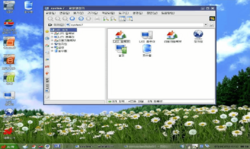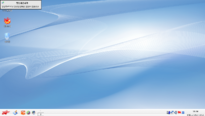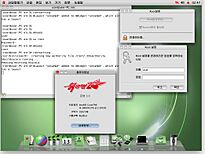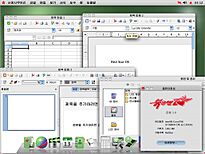Red Star OS facts for kids
 |
|
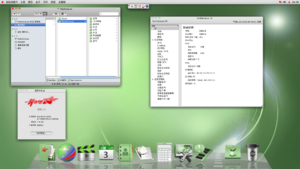
Screenshot of the desktop of Red Star OS 3.0, localized with North Korean terminology and spelling
|
|
| Company / developer | Korea Computer Center, North Korea |
|---|---|
| OS family | Unix-like Linux (desktop and server), Android (on Woolim, Arirang, Samjiyon, Manbang, Jindallae and Ryonghung) |
| Working state | Current |
| Source model |
|
| Latest stable release | 4.0 |
| Marketing target | Personal computers |
| Available language(s) | Korean |
| Supported platforms | IA-32, x86-64 (server only), ARM (mobile and tablet only) |
| Kernel type | Monolithic forked from (Linux kernel) |
| Influenced by | Fedora Linux (desktop), CentOS (Server), Android (mobile and tablet) |
| Default user interface | KDE |
| License | GPL (Linux kernel and other GNU software only), Proprietary |
Red Star OS (Korean: 붉은별; MR: Pulgŭnbyŏl) is a special computer operating system made in North Korea. It's based on Linux, which is a type of computer software. Development of Red Star OS began in 1998 at the Korea Computer Center (KCC).
Before Red Star OS was created, computers in North Korea usually used changed versions of Microsoft Windows. These versions had special language packs for the North Korean language.
Contents
What Can Red Star OS Do?
Web Browser
Red Star OS has its own web browser called Naenara. This name means "Our country" in Korean. Naenara is a changed version of Mozilla Firefox. It's used to look at the Naenara web portal, which is part of North Korea's special national internet called Kwangmyong. The Naenara browser also has two search engines built in.
Other Programs
Red Star OS comes with many other useful programs. These include a text editor for writing, an office suite for documents and spreadsheets, and an e-mail client for sending messages. It also has programs for playing audio and video, a file sharing program, and even some video games.
For example, Red Star OS 3 includes a special version of OpenOffice called Sogwang Office.
How Red Star OS Looks and Works
The operating system uses special versions of KDE Software Compilation for its look and feel. Older versions of Red Star OS had desktops that looked like KDE 3.
Version 3, like earlier versions, uses a tool called Wine. Wine helps the system run programs that were made for Microsoft Windows.
Interestingly, Version 3.0 looks a lot like Apple's macOS operating system. Earlier versions looked more like Windows XP. In 2013, North Korean leader Kim Jong-un was seen with an iMac computer. This might be why Red Star OS 3.0 was designed to look similar to macOS.
Red Star OS is only available in the Korean language. It uses special words and spellings from North Korea. However, it is possible to change the language settings in the BIOS boot menu or by changing the disk image.
| Requirements | ||
|---|---|---|
| Red Star OS | ||
| CPU | 800 MHz Intel Pentium III | |
| Memory | 256 MB | |
| Free space | 3 GB | |
History of Red Star OS
Version 1.0
The first version of Red Star OS came out in 2008. It looked very much like the Windows XP operating system.
This version included the "Naenara" web browser, which was based on Mozilla Firefox. It also had an Office program called "Uri 2.0," based on Open Office. The Wine program was also part of this version.
One copy of this version was shared online. Pictures of the operating system were officially released by KCNA and found by news websites in South Korea.
Version 2.0
Work on version 2.0 started in March 2008 and finished on June 3, 2009. Like the first version, it looked like Windows XP. It cost about 2000 North Korean won, which was around US$15 at the time.
The "Naenara" web browser was also in this version. The browser itself was released on August 6, 2009, as part of the operating system. It cost about 4000 North Korean won, or around US$28.
This operating system uses a special keyboard layout. It is very different from the standard keyboard layout used in South Korea.
Version 3.0
Version 3.0 was introduced on April 15, 2012. Its design looks like macOS operating systems. This new version could use both IPv4 and IPv6 addresses for connecting to networks.
System Rules
Red Star OS 3.0 comes with programs that keep an eye on its users.
If someone tries to turn off the security features, an error message will pop up, or the system might crash and restart.
Also, a special tool built into the system adds a hidden mark to all media files. This mark includes the hard drive's serial number. This helps North Korean authorities track how files are shared.
The system also has hidden "antivirus" software. This software can remove files that are considered not allowed. These files can be removed remotely by the North Korean Secret Service.
There is a user group called "administrator" in the operating system. Regular users do not have full control by default. However, they can get more control by running a built-in tool called "rootsetting."
Even with full control, some files are protected and cannot be changed. The system also checks itself when it starts up to make sure these important files have not been changed.
Version 4.0
Not much information is publicly known about version 4.0.
According to The Pyongyang Times, an official newspaper, Red Star OS 4.0 was developed by January 2019. It was said to have full network support and tools for managing the system and its services.
In June and July 2020, a South Korean news group called NKEconomy (NK경제) got a copy of Red Star OS 4.0. They have published articles about what they found.
Security Issues
In 2016, a computer security company called Hacker House found a problem in the Naenara web browser. This problem could allow someone to run commands on the computer if a user clicked on a specially made link.
Media Attention
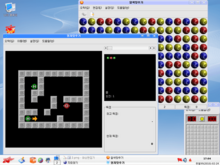
In June 2006, a newspaper in Japan called Choson Sinbo, which is connected to North Korea, interviewed two programmers of Red Star OS. Technology blogs like Engadget and OSnews, and South Korean news services like Yonhap, later shared this information.
In late 2013, Will Scott, who was visiting the Pyongyang University of Science and Technology, bought a copy of Red Star OS 3.0. He bought it from a KCC store in Pyongyang and then shared pictures of the operating system online.
In 2015, two researchers from Germany talked about how the operating system works inside. They spoke at an event called the Chaos Communication Congress. They explained that the system adds a hidden mark to all files on portable storage devices, like USB flash drives. This helps track the sharing of foreign movies, music, and writings.
See also
 In Spanish: Red Star OS para niños
In Spanish: Red Star OS para niños
- Internet in North Korea
- Telecommunications in North Korea
 | James B. Knighten |
 | Azellia White |
 | Willa Brown |



